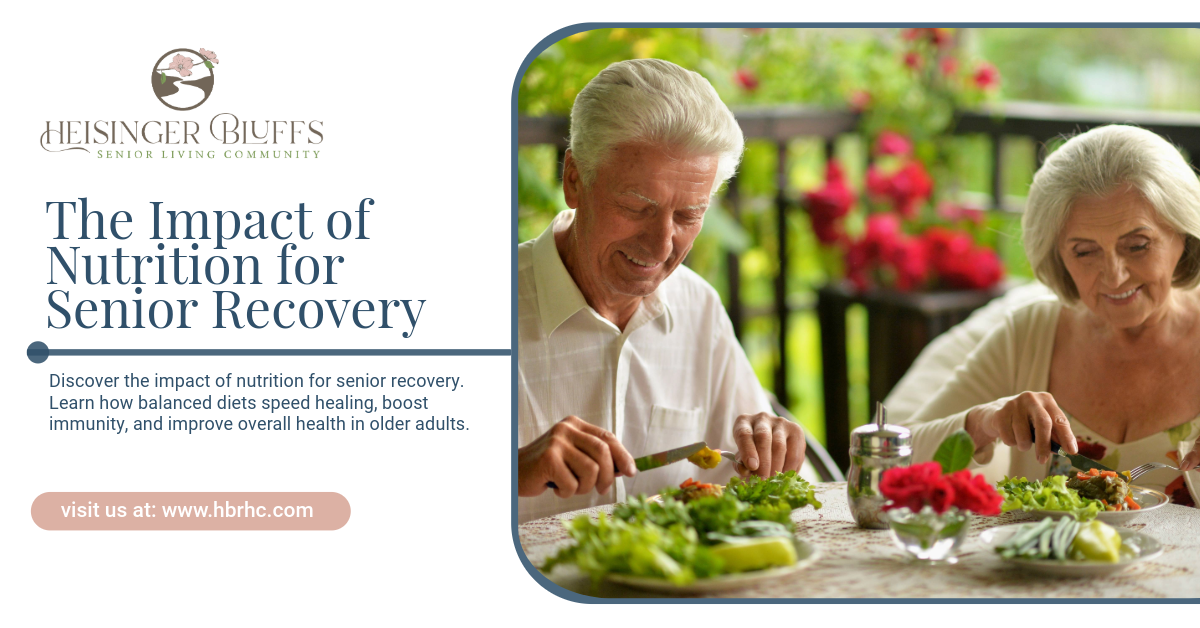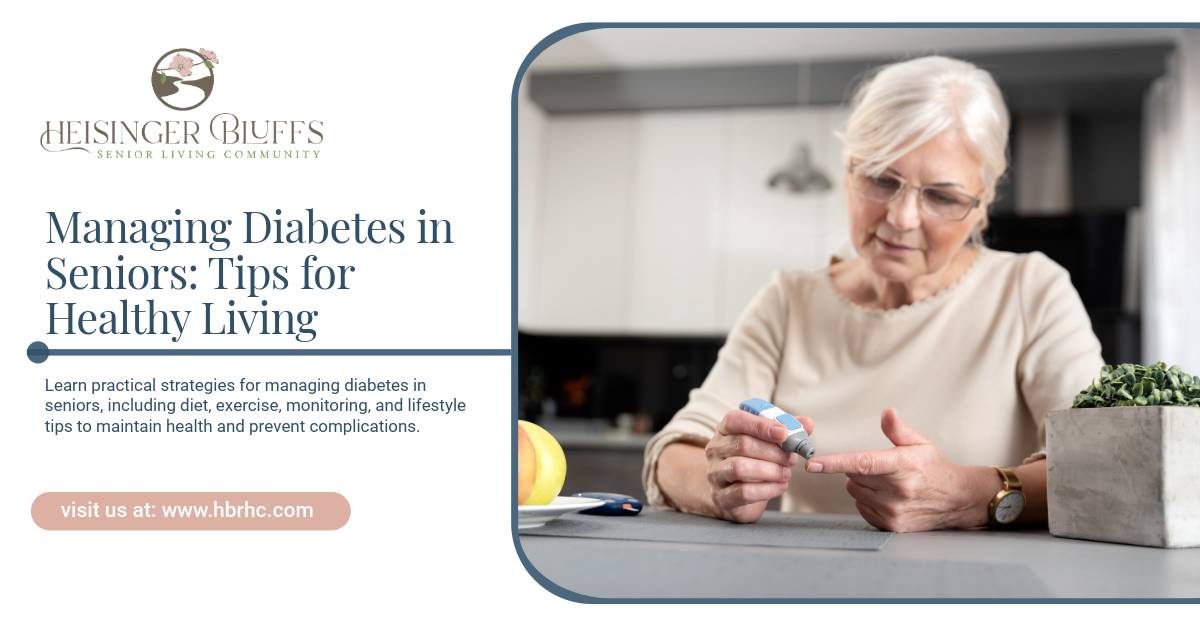The Impact of Nutrition for Senior Recovery

Nutrition plays a powerful role in health at any age—but for seniors, it becomes even more essential during recovery from illness, surgery, or injury. As the body ages, it processes nutrients differently, muscle mass naturally decreases, and the immune system becomes less robust. This means that recovery can take longer—unless the body is supported with the right nutrients at the right time.
In this guide, we’ll explore how nutrition affects senior recovery, which foods and nutrients are most important, and how to make eating easier for older adults who may face appetite changes or other challenges.
Why Nutrition Matters More for Seniors
As people age, the body undergoes changes that directly impact nutritional needs and recovery speed. These include:
- Slower metabolism: Nutrients take longer to process, requiring higher-quality food choices.
- Reduced muscle mass: Healing after surgery or injury demands more protein.
- Weaker immune system: Proper nutrition strengthens defenses against infections.
- Chronic conditions: Illnesses like diabetes, heart disease, or arthritis can increase nutrient demands.
- Medication interactions: Some prescriptions can deplete vitamins and minerals.
When a senior is recovering, whether from a broken bone, pneumonia, or a planned medical procedure, proper nutrition helps repair tissues, fight infection, and restore strength.
Key Nutrients for Senior Recovery
While all nutrients are important, certain vitamins, minerals, and macronutrients play a more direct role in healing.
| Nutrient | Role in Recovery | Best Sources |
|---|---|---|
| Protein | Repairs tissues, maintains muscle mass, supports immune system | Lean meats, poultry, fish, eggs, dairy, beans, tofu |
| Vitamin C | Boosts collagen production for wound healing, strengthens immunity | Citrus fruits, strawberries, bell peppers, broccoli |
| Vitamin D | Aids calcium absorption for bone repair, supports immune function | Fatty fish, fortified dairy, sunlight |
| Calcium | Strengthens bones and prevents fractures | Dairy products, leafy greens, fortified plant-based milk |
| Zinc | Speeds wound healing and cell growth | Meat, seafood, whole grains, nuts |
| Omega-3 Fatty Acids | Reduces inflammation, supports heart and brain health | Salmon, walnuts, flaxseeds |
| Fiber | Supports digestion and prevents constipation from inactivity or medications | Whole grains, fruits, vegetables, legumes |
| Fluids | Maintains hydration, supports circulation, prevents urinary infections | Water, herbal tea, broth-based soups |
The Link Between Malnutrition and Delayed Recovery
Malnutrition is more common among seniors than many realize. According to the National Council on Aging, nearly 1 in 2 older adults is at risk of malnutrition due to illness, isolation, or difficulty preparing meals.
Signs of malnutrition in seniors:
- Unintentional weight loss
- Fatigue or weakness
- Poor wound healing
- Increased infections
- Reduced appetite
When the body doesn’t receive enough nutrients, recovery slows dramatically. Muscle loss accelerates, immune function drops, and the risk of complications rises.
Special Dietary Considerations During Recovery
Not all seniors can eat the same diet during recovery—medical conditions, medications, and chewing or swallowing difficulties may require adjustments.
1. For Bone Healing
- Increase calcium and vitamin D intake
- Add protein-rich snacks like Greek yogurt or cottage cheese
- Limit caffeine and alcohol, which can weaken bone density
2. For Wound Healing
- Prioritize protein and vitamin C
- Include zinc-rich foods like nuts and seeds
- Stay hydrated to keep skin and tissues supple
3. For Immune Recovery After Illness
- Eat antioxidant-rich foods like berries, leafy greens, and carrots
- Add probiotic sources like yogurt and kefir for gut health
- Include healthy fats from avocado and fish
Overcoming Common Barriers to Good Nutrition in Seniors
Even when seniors know the importance of good nutrition, they may face challenges that make eating well difficult.
Common barriers include:
- Loss of appetite
- Difficulty chewing or swallowing
- Changes in taste due to medications
- Limited mobility for shopping or cooking
- Financial constraints
Solutions:
- Prepare smaller, nutrient-dense meals instead of large portions
- Use soft or pureed foods for those with chewing issues
- Enhance flavor with herbs and spices instead of excess salt
- Encourage social meals to boost appetite
- Seek meal delivery services or caregiver assistance
Hydration: The Overlooked Recovery Essential
Hydration is just as important as food during recovery. Dehydration can lead to confusion, urinary tract infections, constipation, and slower healing.
Hydration tips for seniors:
- Offer water throughout the day, not just at meals
- Add slices of lemon or berries for flavor
- Include soups, smoothies, and water-rich fruits like watermelon
- Avoid excessive caffeinated or sugary drinks
How Caregivers Can Support Nutritional Recovery
Family members and caregivers play a key role in ensuring seniors get the nutrition they need during recovery.
Ways to help:
- Plan balanced meals in advance
- Stock healthy snacks within easy reach
- Monitor portion sizes to prevent under- or overeating
- Keep track of fluid intake
- Work with a dietitian to address medical dietary needs
Sample One-Day Recovery Meal Plan for Seniors
| Meal | Foods | Key Nutrients |
|---|---|---|
| Breakfast | Scrambled eggs with spinach, whole-grain toast, orange slices | Protein, Vitamin C, Fiber |
| Snack | Greek yogurt with blueberries and honey | Protein, Antioxidants, Calcium |
| Lunch | Lentil soup, side salad with olive oil dressing | Protein, Fiber, Omega-3 |
| Snack | Handful of walnuts and apple slices | Healthy fats, Fiber, Vitamin C |
| Dinner | Baked salmon, steamed broccoli, quinoa | Omega-3, Protein, Vitamin C |
| Evening | Herbal tea and fortified plant-based milk | Hydration, Calcium, Vitamin D |
The Emotional Side of Eating During Recovery
Eating well isn’t just about nutrients—it’s also about enjoyment and comfort. Seniors recovering from illness or surgery may feel anxious, depressed, or unmotivated to eat. Making meals appealing, colorful, and social can boost both appetite and mood.
Simple strategies include:
- Serving food on brightly colored plates for visual appeal
- Playing soft music during meals
- Eating together whenever possible
- Allowing personal food preferences within dietary guidelines
Professional Nutrition Support for Recovery
Sometimes, seniors benefit from professional nutritional guidance—especially after a hospital stay or major surgery. A registered dietitian can:
- Customize meal plans for medical needs
- Recommend supplements if necessary
- Provide tips for overcoming appetite changes
- Monitor progress and adjust diets as recovery advances
At Heisinger Bluffs, we understand that recovery is a journey. Our team provides nutrient-rich meals, hydration support, and individualized dietary planning to help seniors heal faster, feel stronger, and regain their independence. Reach out today!
Frequently Asked Questions
How much protein should a senior have during recovery?
Most seniors need 1.0–1.2 grams of protein per kilogram of body weight during recovery, but needs may vary depending on medical conditions.
Are supplements necessary for recovery?
Supplements can help if dietary intake is insufficient, but they should be used under medical supervision to avoid interactions.
What foods help wounds heal faster?
Protein-rich foods, vitamin C sources, zinc, and adequate fluids all support wound healing.
Can dehydration slow recovery?
Yes. Dehydration can lead to fatigue, confusion, constipation, and delayed healing.
How can I help a senior with no appetite eat more?
Offer smaller, more frequent meals, add nutrient-dense snacks, and make meals visually appealing and flavorful.
Sources:
- https://pmc.ncbi.nlm.nih.gov/articles/PMC2880224/
- https://www.ncoa.org/article/the-top-10-most-common-chronic-conditions-in-older-adults/
- https://pmc.ncbi.nlm.nih.gov/articles/PMC8399049/
- https://www.ncoa.org/article/malnutrition-may-be-hiding-in-plain-sight/
- https://www.uclahealth.org/news/article/it-normal-lose-your-appetite-you-get-older
- https://www.ncoa.org/article/how-to-stay-hydrated-for-better-health/











